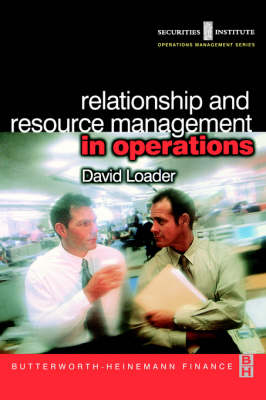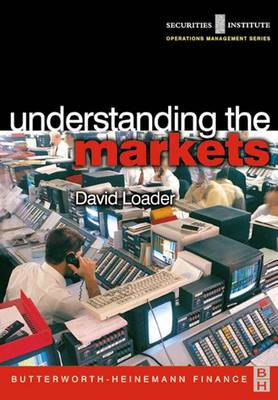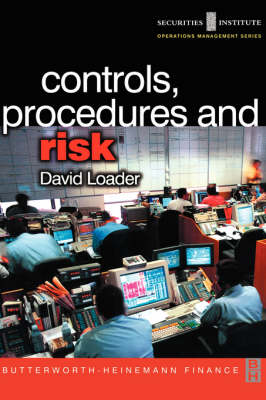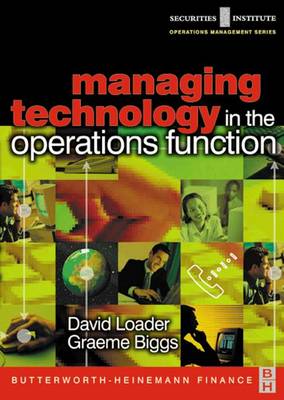Operations Management
5 total works
'Relationship and Resource Management in Operations' explains in practical terms the importance of the business relationships with internal and external counterparts while demonstrating how things can go wrong and what causes the situation. The authors examine the need to instil cultures in the team focusing on client service, risk and cost effectiveness. The text covers, via practical examples, the kind of scenario managers or supervisors might face in their role and shows what decisions could and should be made.
The operations function in a financial organization is crucial to the success of the business. It drives both profitability and reputation as well as contributing to business development and support. It is also a complex part of a business and one that is treated differently in different types of organizations. The complexity of operations and the diverseness of the teams and the people they interact with create a need for a high degree of relationship and resource management.
For instance a bank that is involved in both retail and investment banking will have hundreds of different relationship situations, but so too will a small private client broker. Some situations may be common to all types of organizations; others common to particular types of organizations and a few will be very specific to an organization. These relationships may be very open or highly discreet and confidential.
Whatever the type of relationship, whether problematic or successful, it is likely that any problems will have an impact of the business. For operations managers their role is a key one. Charged with managing resources and the numerous relationship issues, it is neither a simple task nor, because of the variety and frequency of the issues that might arise, one that is easy to find solutions for. This book, however, explores some of the situations that managers might find themselves in and puts forward some solutions.
Relationships and resources are the energy source that makes operations work and managed well they will provide the means to grow and to attain success. The central aim of this book is to provide knowledge and guidance on this important and key area of operations management. Successful operations teams are built on talented resource and effective management - let this book be your guide.
The operations function in a financial organization is crucial to the success of the business. It drives both profitability and reputation as well as contributing to business development and support. It is also a complex part of a business and one that is treated differently in different types of organizations. The complexity of operations and the diverseness of the teams and the people they interact with create a need for a high degree of relationship and resource management.
For instance a bank that is involved in both retail and investment banking will have hundreds of different relationship situations, but so too will a small private client broker. Some situations may be common to all types of organizations; others common to particular types of organizations and a few will be very specific to an organization. These relationships may be very open or highly discreet and confidential.
Whatever the type of relationship, whether problematic or successful, it is likely that any problems will have an impact of the business. For operations managers their role is a key one. Charged with managing resources and the numerous relationship issues, it is neither a simple task nor, because of the variety and frequency of the issues that might arise, one that is easy to find solutions for. This book, however, explores some of the situations that managers might find themselves in and puts forward some solutions.
Relationships and resources are the energy source that makes operations work and managed well they will provide the means to grow and to attain success. The central aim of this book is to provide knowledge and guidance on this important and key area of operations management. Successful operations teams are built on talented resource and effective management - let this book be your guide.
Four new chapters and updates throughout help this 2e of Clearing, Settlement and Custody summarize worldwide changes in the process of concluding a financial transaction. Noted consultant David Loader provides a highly detailed analysis of the central clearing counterparty concept, the drivers behind it, and its effects on operations teams. He also clearly illustrates the life cycle of a series of transactions to broaden the comparison process.
Emphasizing changes in the regulatory environment stemming from the 2008 market crash and liquidity crisis, this edition uses new case studies and end-of-chapter quizzes to explore the transaction value chain of trading, clearing, settlement, and custody. Students and professionals in the financial field will benefit from the book's description of the industry and the details of financial innovation and regulatory response, with their many implications.
Emphasizing changes in the regulatory environment stemming from the 2008 market crash and liquidity crisis, this edition uses new case studies and end-of-chapter quizzes to explore the transaction value chain of trading, clearing, settlement, and custody. Students and professionals in the financial field will benefit from the book's description of the industry and the details of financial innovation and regulatory response, with their many implications.
An analysis of the major securities, derivatives and money markets from an operations point of view, 'Understanding the Markets' takes the reader through the major features and characteristics of the markets and the products. The relationship between the trading and dealing functions and the operations functions is examined and the issues discussed.
This book looks at the financial markets from the viewpoint of the person working in the operations functions that support the trading, dealing and investment processes, and as such is essential reading in order to fully understand the industry - an industry which has gone, and is still going through, much change.
As the markets undergo change so too do the administration, clearing and settlement functions, as the clearing houses, securities depositories and custodians merge and diversify. This is going to impact on the operations teams that support the trading, sales and retail business. A failure to be aware of and to understand the impact of changes in the markets will create massive problems, greater risk and ultimately financial losses. And yet the sheer size and diversity of the global markets, together with the rapid pace of change and expansion, and the increasing volume of transactions needing to be processed, presents a massive challenge to operations teams and managers.
Knowing how the markets work and what impacts on the operations team is crucial for managers and supervisors. In this book the author provides a full explanation of the markets and their impact in operations terms. So if you are about to embark on a career in operations 'Understanding the Markets' is essential reading. Alternatively, if you are planning a career as a dealer it will prove very useful in explaining the process that occurs after you have traded.
This book looks at the financial markets from the viewpoint of the person working in the operations functions that support the trading, dealing and investment processes, and as such is essential reading in order to fully understand the industry - an industry which has gone, and is still going through, much change.
As the markets undergo change so too do the administration, clearing and settlement functions, as the clearing houses, securities depositories and custodians merge and diversify. This is going to impact on the operations teams that support the trading, sales and retail business. A failure to be aware of and to understand the impact of changes in the markets will create massive problems, greater risk and ultimately financial losses. And yet the sheer size and diversity of the global markets, together with the rapid pace of change and expansion, and the increasing volume of transactions needing to be processed, presents a massive challenge to operations teams and managers.
Knowing how the markets work and what impacts on the operations team is crucial for managers and supervisors. In this book the author provides a full explanation of the markets and their impact in operations terms. So if you are about to embark on a career in operations 'Understanding the Markets' is essential reading. Alternatively, if you are planning a career as a dealer it will prove very useful in explaining the process that occurs after you have traded.
'Controls, Procedures and Risk' covers the skills and procedures needed to enable the monitoring and managing of risk and the authors focus on procedures design, implementation and documentation. Considerable emphasis is also given to the key controls and the importance of control functions, audit and risk management groups and policy. Case studies are used to effectively demonstrate 'success' and 'failure'.
In the financial services industry risk is a constant threat to organizations of all sizes and to the markets themselves. Many industry 'events' have shown how dangerous it is when a business operates in an uncontrolled way, particularly when the lack of control was not evident to the management of the business until it was too late.
Controls, procedures and risk are occupying more and more management time. The responsibility to manage the risks lies with the whole operations team. If it is successful in fulfilling this role the overall risk of the business is reduced, if it is not successful the consequences may be severe.
In this book the author has deliberately focussed on the practical side of risk, controls and procedures, rather than analyse the Basel Capital Accord and the capital requirements etc.(however, the Accord and updates are contained in the Appendices). Operations teams need to be aware of risk but not overwhelmed by it.
Risk management within, and by, the operations function is the focus of this book. From day-to-day risk to wider risk implications the operations function is reviewed to show the sources and implications of risk situations.
In the financial services industry risk is a constant threat to organizations of all sizes and to the markets themselves. Many industry 'events' have shown how dangerous it is when a business operates in an uncontrolled way, particularly when the lack of control was not evident to the management of the business until it was too late.
Controls, procedures and risk are occupying more and more management time. The responsibility to manage the risks lies with the whole operations team. If it is successful in fulfilling this role the overall risk of the business is reduced, if it is not successful the consequences may be severe.
In this book the author has deliberately focussed on the practical side of risk, controls and procedures, rather than analyse the Basel Capital Accord and the capital requirements etc.(however, the Accord and updates are contained in the Appendices). Operations teams need to be aware of risk but not overwhelmed by it.
Risk management within, and by, the operations function is the focus of this book. From day-to-day risk to wider risk implications the operations function is reviewed to show the sources and implications of risk situations.
Managing Technology in the Operations Function
by David Loader and Graeme Biggs
Published 1 January 2002
'Managing Technology in The Operations Function' looks at issues in technology from the operations function rather than from an IT perspective. It explores the use of technology for processing, provision of client services, risk management and business management. The authors analyse the benefits of straight through processing and the practical implications of managing technology products in operations. System risk and opportunities are explored and case studies are examined along with industry trends to assess upcoming developments and their impacts.
The use of technology is one of the key drivers of growth in the volumes of business in the financial markets today. The impact that technology has had, and is still having in the operations function is truly substantial. Technology now reaches into just about every aspect of the business. Electronic trading, messaging systems, and information distribution have created a global market that is, relatively speaking, instantly accessible and available.
For operations this manifests itself in two ways: the automation of processes and the automation of information gathering and distribution. For operations managers this period of change has elevated the function from a pure support service into a dynamic revenue protector/generator, with a heavy client service and risk management focus.
The reliance on technology to drive this progression forward and to meet the challenge is therefore of crucial consideration for the operations manager.
The challenge for the operations teams and managers is to embrace technology and maximize the use of this vital and powerful tool within the business. A failure to do so will inevitably have a negative impact on the operations function and ultimately damage the whole business.
The use of technology is one of the key drivers of growth in the volumes of business in the financial markets today. The impact that technology has had, and is still having in the operations function is truly substantial. Technology now reaches into just about every aspect of the business. Electronic trading, messaging systems, and information distribution have created a global market that is, relatively speaking, instantly accessible and available.
For operations this manifests itself in two ways: the automation of processes and the automation of information gathering and distribution. For operations managers this period of change has elevated the function from a pure support service into a dynamic revenue protector/generator, with a heavy client service and risk management focus.
The reliance on technology to drive this progression forward and to meet the challenge is therefore of crucial consideration for the operations manager.
The challenge for the operations teams and managers is to embrace technology and maximize the use of this vital and powerful tool within the business. A failure to do so will inevitably have a negative impact on the operations function and ultimately damage the whole business.




